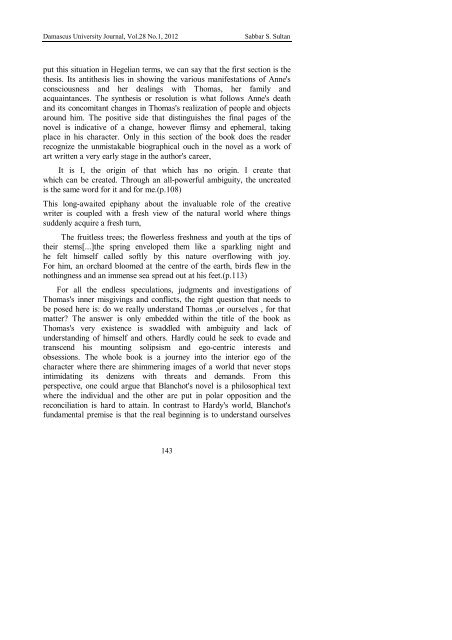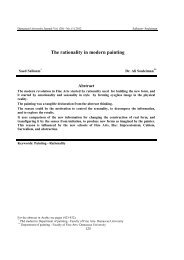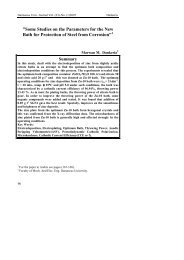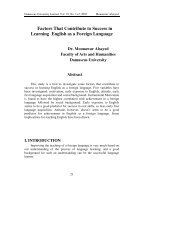Types of Obscurity in Thomas Hardy's Jude the Obscure and ...
Types of Obscurity in Thomas Hardy's Jude the Obscure and ...
Types of Obscurity in Thomas Hardy's Jude the Obscure and ...
Create successful ePaper yourself
Turn your PDF publications into a flip-book with our unique Google optimized e-Paper software.
Damascus University Journal, Vol.28 No.1, 2012Sabbar S. Sultanput this situation <strong>in</strong> Hegelian terms, we can say that <strong>the</strong> first section is <strong>the</strong><strong>the</strong>sis. Its anti<strong>the</strong>sis lies <strong>in</strong> show<strong>in</strong>g <strong>the</strong> various manifestations <strong>of</strong> Anne'sconsciousness <strong>and</strong> her deal<strong>in</strong>gs with <strong>Thomas</strong>, her family <strong>and</strong>acqua<strong>in</strong>tances. The syn<strong>the</strong>sis or resolution is what follows Anne's death<strong>and</strong> its concomitant changes <strong>in</strong> <strong>Thomas</strong>'s realization <strong>of</strong> people <strong>and</strong> objectsaround him. The positive side that dist<strong>in</strong>guishes <strong>the</strong> f<strong>in</strong>al pages <strong>of</strong> <strong>the</strong>novel is <strong>in</strong>dicative <strong>of</strong> a change, however flimsy <strong>and</strong> ephemeral, tak<strong>in</strong>gplace <strong>in</strong> his character. Only <strong>in</strong> this section <strong>of</strong> <strong>the</strong> book does <strong>the</strong> readerrecognize <strong>the</strong> unmistakable biographical ouch <strong>in</strong> <strong>the</strong> novel as a work <strong>of</strong>art written a very early stage <strong>in</strong> <strong>the</strong> author's career,It is I, <strong>the</strong> orig<strong>in</strong> <strong>of</strong> that which has no orig<strong>in</strong>. I create thatwhich can be created. Through an all-powerful ambiguity, <strong>the</strong> uncreatedis <strong>the</strong> same word for it <strong>and</strong> for me.(p.108)This long-awaited epiphany about <strong>the</strong> <strong>in</strong>valuable role <strong>of</strong> <strong>the</strong> creativewriter is coupled with a fresh view <strong>of</strong> <strong>the</strong> natural world where th<strong>in</strong>gssuddenly acquire a fresh turn,The fruitless trees; <strong>the</strong> flowerless freshness <strong>and</strong> youth at <strong>the</strong> tips <strong>of</strong><strong>the</strong>ir stems[...]<strong>the</strong> spr<strong>in</strong>g enveloped <strong>the</strong>m like a sparkl<strong>in</strong>g night <strong>and</strong>he felt himself called s<strong>of</strong>tly by this nature overflow<strong>in</strong>g with joy.For him, an orchard bloomed at <strong>the</strong> centre <strong>of</strong> <strong>the</strong> earth, birds flew <strong>in</strong> <strong>the</strong>noth<strong>in</strong>gness <strong>and</strong> an immense sea spread out at his feet.(p.113)For all <strong>the</strong> endless speculations, judgments <strong>and</strong> <strong>in</strong>vestigations <strong>of</strong><strong>Thomas</strong>'s <strong>in</strong>ner misgiv<strong>in</strong>gs <strong>and</strong> conflicts, <strong>the</strong> right question that needs tobe posed here is: do we really underst<strong>and</strong> <strong>Thomas</strong> ,or ourselves , for thatmatter? The answer is only embedded with<strong>in</strong> <strong>the</strong> title <strong>of</strong> <strong>the</strong> book as<strong>Thomas</strong>'s very existence is swaddled with ambiguity <strong>and</strong> lack <strong>of</strong>underst<strong>and</strong><strong>in</strong>g <strong>of</strong> himself <strong>and</strong> o<strong>the</strong>rs. Hardly could he seek to evade <strong>and</strong>transcend his mount<strong>in</strong>g solipsism <strong>and</strong> ego-centric <strong>in</strong>terests <strong>and</strong>obsessions. The whole book is a journey <strong>in</strong>to <strong>the</strong> <strong>in</strong>terior ego <strong>of</strong> <strong>the</strong>character where <strong>the</strong>re are shimmer<strong>in</strong>g images <strong>of</strong> a world that never stops<strong>in</strong>timidat<strong>in</strong>g its denizens with threats <strong>and</strong> dem<strong>and</strong>s. From thisperspective, one could argue that Blanchot's novel is a philosophical textwhere <strong>the</strong> <strong>in</strong>dividual <strong>and</strong> <strong>the</strong> o<strong>the</strong>r are put <strong>in</strong> polar opposition <strong>and</strong> <strong>the</strong>reconciliation is hard to atta<strong>in</strong>. In contrast to <strong>Hardy's</strong> world, Blanchot'sfundamental premise is that <strong>the</strong> real beg<strong>in</strong>n<strong>in</strong>g is to underst<strong>and</strong> ourselves143
















